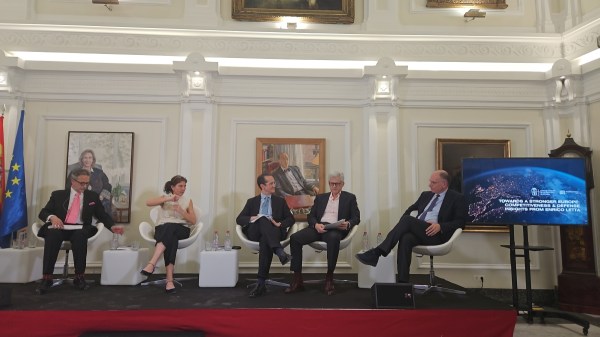Telefónica Public Policy & Telefónica España Regulatory teams
I suppose everyone would agree on the importance which education and skills for the use of ICT services plays in fulfilling the objectives of the Digital Agenda and Europe 2020 Strategy. It therefore comes without much surprise that at the 1st Digital Agenda Assembly last week the issue of Mainstreaming e-Learning in education and training was one of the hot topics discussed.
ICT skills and knowledge are crucial to have our citizens well prepared to get the best out of ICT technology not just for their own personal sake, but also for the benefit of Europe as a highly competitive market.
Nobody should be left out in this urge for building up know-how in this sector. We not only need to get the younger generation involved, but also older citizens, with their fast experience and professional knowledge, which is particularly important for a profound and sustainable development in Europe.
This is one reason why alternative learning methods such as e-learning are very much in everyone’s focus. Such new ways of learning are the basis for ensuring that all people have easy and open access to the required expertise and that certain fears towards the digital world which still exist in today’s society may be dissolved.
Also companies from the ICT sector – having obviously an interest that new technologies and services are used by all parts of the population – need to contribute to this task. Telefónica for example already supports for many years the EducaRed platform which was created in 1998 by the Foundation of Telefónica in collaboration with the Spanish educational community. It has two main objectives: Helping to improve the quality of education and promoting equal opportunities through the use of ICT in the teaching and learning processes.
There is currently much debate going on about how the e-learning tools should be constructed and designed and which contents are most important to convey the necessary knowledge. It seems to be very difficult to find a way to teach specific skills outside of traditional educational institutions. But if you are leaving aside the issue of e-learning and look only at the effectiveness of transporting ICT knowledge within our schools, you will also encounter the need for improvement. Although today’s young people are known to have a high affinity for all topics related to ICT and multimedia applications, schools are in most cases not really succeeding to channel that interest and provide appropriate knowledge to the students. But this would be not only an important prerequisite for exploiting the full potential of digital technologies, but also would have the positive effect that the protection of minors would be encouraged by the fact that the young users have better knowledge about the functionality of the digital world and is more aware of the dangers connected to it.
So if it is not for the fact that the young people lack interest concerning ICT, then what is the problem that European schools have with the effective transport of knowledge?
I believe one reason is that in most European countries we still apply a very conservative and outdated method of transferring knowledge such as the traditional “ex-cathedra teaching”, where the teacher stands in the center?
Maybe the issue of digital literacy is showing us clearly the general limits of an old-fashioned system in educating our children?
What makes it worse is that it is exactly ICT services and eLearning tools that could provide a good solution and engage our children in a better way.
We should be aware that the stakes are high: If we do not find a way to foster the immense creative and innovative spirit of Europe’s young generation, the implementation of the goals of the Digital Agenda 2020 will be difficult to achieve.
And with that finally also Europe’s prosperity is at stake.
So perhaps it is time to start reforming our teaching system not only in regards to the transfer of ICT knowledge, but in a more general and profound way?
Interesting information related to the topic:
EducaRed; Telefónica’s activities to improve education
Neelie Kroes on Digital Literacy:
Neelie Kroes Blog: Youth engagement will make the Digital Agenda a reality
Sir Ken Robinson: Bring on the learning revolution!
Susanne Faude,
Public Policy Department, International Office.













